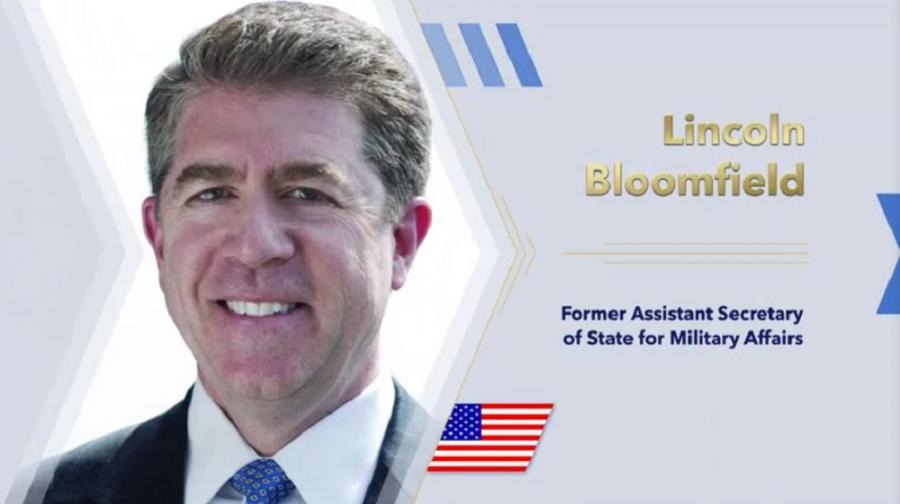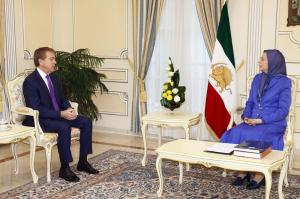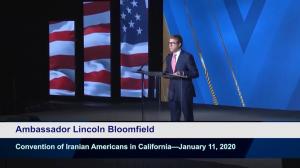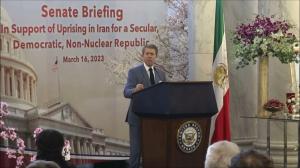
(Video) Lincoln Bloomfield Shares Insights on U.S. Policy and Iranian Resistance in Latest Iran:The Untold Story Podcast
Drawing from his extensive research and publications, Amb. Bloomfield addresses the PMOI’s relationship with Iraq, during the eight-year Iran-Iraq war.
PARIS, FRANCE, June 17, 2024 /EINPresswire.com/ -- The National Council of Resistance of Iran (NCRI) Foreign Affairs Committee in an article published in the latest episode of the “Iran: The Untold Story” podcast, Ambassador Lincoln Bloomfield Jr., former U.S. Assistant Secretary of State for Political and Military Affairs and Deputy Assistant Secretary of State for Near Eastern Affairs, provides an in-depth analysis of U.S. understanding of the Iranian Resistance movement.
He delves into the history of the People’s Mojahedin Organization of Iran (PMOI/MEK) and his pivotal role in dismantling Tehran’s misinformation campaign and removing the from the U.S. terrorist list.
Ambassador Bloomfield recounts his initial encounter with the PMOI and the rigorous investigation he undertook to uncover the organization’s true nature amidst a flood of misleading data within Washington’s bureaucracy.
He explains the critical efforts that led former U.S. Secretary of State Hillary Clinton to delist the PMOI, underscoring the complexity and significance of this decision.
Drawing from his extensive research and publications, Amb. Bloomfield addresses the PMOI’s relationship with Iraq, specifically during the eight-year Iran-Iraq war.
He scrutinizes allegations that the PMOI sided with Baghdad and the claims of the organization’s involvement in the killing of Americans, providing historical context and sources for these accusations.
The ambassador also explores why the PMOI has been labeled a “cult” by various experts and policymakers, noting how these claims intensified following the removal of the terrorist designation.
He contrasts the organization’s interpretation of Islam with that of the clerical regime in Iran, highlighting the ideological differences and the PMOI’s spiritual guidance throughout their struggle.
Amb. Bloomfield discusses other Iranian groups, particularly monarchist factions, explaining why they lack political credibility. He elaborates on his experiences working with the National Council of Resistance of Iran (NCRI) and its President-elect Maryam Rajavi, sharing his motivations for supporting the movement and why he continues to endorse NCRI’s Ten-Point Plan as a roadmap to transition from tyranny to democracy in Iran.
Concluding with policy recommendations, Ambassador Bloomfield advises how the U.S. government should navigate its relations with the Iranian regime and recalibrate its stance towards the NCRI and PMOI.
His insights offer a nuanced perspective on a complex geopolitical issue, making this podcast episode a must-listen for those interested in U.S.-Iran relations and the future of the Iranian Resistance.
Amb. Lincoln Bloomfield Unveils Journey and Evidence Behind MEK’s Delisting from U.S. Terrorist List
In a recent episode of the “Iran: The Untold Story” podcast, Ambassador Lincoln Bloomfield Jr., former U.S. Assistant Secretary of State for Political and Military Affairs and Deputy Assistant Secretary of State for Near Eastern Affairs, provided an in-depth look into his work and discoveries about the People’s Mojahedin Organization of Iran (MEK), Iran’s principal opposition movement. Bloomfield, who has authored several publications on the MEK, recounted his journey from skepticism to advocacy.
During his tenure as a consultant at a Washington law firm, the former U.S. Assistant Secretary of State for Political and Military Affairs was approached by Iranian Americans from Northern California to aid in removing the MEK from the U.S. terrorist list.
Although initially hesitant to accept, his curiosity was piqued when he noticed a troubling uniformity in the negative portrayal of the MEK across various think tanks. Descriptions labeled the group as a cult, Marxists, terrorists, and collaborators with Saddam Hussein, and cited their alleged involvement in the 1979 U.S. embassy hostage crisis and the Iran-Iraq war.
Bloomfield’s investigation began in earnest after a trip to Paris in 2011, marking the 30th anniversary of a pivotal protest led by MEK founder Massoud Rajavi against the clerical regime’s Supreme Leader Ruhollah Khomeini’s regime back in 1981.
This protest led to a brutal crackdown, resulting in the arrest and execution of thousands of MEK supporters. Bloomfield delved into the MEK’s history, scrutinizing documents and testimonies contradicting the prevalent negative narratives.
In his pursuit of the truth, Bloomfield produced an independent report challenging ten major allegations against the MEK. His report, replete with evidence and counterarguments, was distributed widely, including to Congress and the executive branch.
This report played a crucial role in pressuring then-Secretary of State Hillary Clinton to reassess the MEK’s terrorist designation. Ultimately, Clinton decided to remove the MEK from the list, citing a lack of substantial evidence to support the terrorist label.
Bloomfield’s revelations culminated in his 2013 book, boldly titled to highlight the MEK and challenge the existing stigma. He meticulously documented the discrepancies and evolution of terrorism reports over the years, arguing that the MEK had been grossly misrepresented.
His research uncovered a significant propaganda campaign orchestrated by the Iranian regime to discredit the MEK both domestically and internationally.
Bloomfield emphasized that this misinformation campaign was driven by the regime’s fear and vulnerability, suggesting that the MEK poses a substantial threat to the regime’s stability.
Amb. Lincoln Bloomfield Refutes Allegations of MEK Collaborating with Iraq’s Saddam Hussein
Ambassador Lincoln Bloomfield, a seasoned diplomat and scholar, has conducted extensive research on the allegations against the People’s Mojahedin Organization of Iran (PMOI/MEK).
His insights, encapsulated in numerous books and articles, were elaborated upon during a discussion on the podcast “The Untold Story.” In this article, we delve into one specific allegation: the claim that the MEK fought alongside Saddam Hussein’s forces during the Iran-Iraq War.
Bloomfield’s 2019 publication, “The Ayatollahs and the MEK: Iran’s Crumbling Influence Operation,” meticulously unravels and debunks many of the Iranian regime’s disinformation campaigns against the MEK. In his discussion, Bloomfield addresses the allegation of the MEK’s supposed collaboration with Saddam Hussein’s forces.
“As many people will remember, Iraq invaded Iran in September of 1980, not too long after the revolution took place. And when that happened, MEK members raced to the front lines along with others and fought against the Iraqis and some were captured by Saddam’s forces.
They were held as prisoners of war,” Bloomfield notes. This account is critical in questioning the narrative of MEK’s collaboration with Saddam. He adds, “If there were any truth that the MEK and the NCRI were in some ways allies of Saddam Hussein, why did he keep their POWs imprisoned until 1989?”
Bloomfield highlights the timeline discrepancies that further discredit this allegation. “The MEK didn’t even come to Iraq until July of 1986, years later. They didn’t start acquiring weapons until after that. And the National Liberation Army that they put together was in 1987. And they only really performed one major operation, which was to try to march on Tehran, which was their purpose.”
The ambassador also mentions the MEK’s financial independence in their military endeavors. “By the way, I can’t prove this, but the members of the NCRI say, we have all the receipts. We paid in cash for all of our weapons. In other words, they were not provided free by Saddam. Now that’s something they say, so I can’t stand behind it, but that’s what they say.”
Bloomfield provides context on the geopolitical climate during the Iran-Iraq War, particularly the ambitions of Khomeini. “By 1982, the middle of 1982, Iraq had pushed all of the forces back out of Iran.
There were no longer any Iraqi forces. And Massoud Rajavi in Paris tried to end the war by persuading Saddam Hussein’s government to accept an end of belligerence, a withdrawal of all forces, an exchange of prisoners. And this was, I think, presented a couple of times to Ayatollah Khomeini. And he had no interest in ending the war.”
The ambassador elaborates on Khomeini’s broader ambitions and how they influenced his domestic policies and treatment of the MEK. “Khomeini was failing to control the Iran population.
And so, he extended the state of emergency, kept the war going, still not willing to give up on his dream of creating a religious authority over the Shia of Iraq and extending it further through the Levant toward Jerusalem. And he used it as an excuse for jailing, imprisoning, torturing, and executing people who didn’t follow his orders, including all the sympathizers of the MEK.”
Crucially, Bloomfield refutes the allegation of the MEK’s military collaboration with Saddam. “Never, not once did the MEK and the National Liberation Army ever participate in any military operation with Iraq’s forces. Not once ever.
And don’t forget, the American military captured all of the hard drives of the Saddam Hussein government, and the Pentagon certainly knew that there had never been any MEK involvement against the Kurds or against the Shia, which we’ve heard for years.”
The ambassador underscores the importance of understanding the true nature of these disinformation campaigns. “These things have gone away now.
And frankly, one day historians will look at what Khomeini did before Iraq invaded, and they might conclude that Khomeini provoked that attack because he was attacking inside Iraq and calling for regime change against Saddam Hussein.
So, it’s a whole different story, but it was important for Khomeini and for the Shah before him to demonize these smart student idealists who did not accept dictatorship, whether it was monarch or religious. They wanted Iranians to control their destiny, like other countries, through the ballot box.”
In conclusion, the level of demonization and disinformation against the MEK and the National Council of Resistance of Iran (NCRI) underscores the Iranian regime’s fear of the only organized opposition.
As Ambassador Bloomfield aptly puts it, “They’ve been deliberately promoting inside and outside Iran one set of completely wrong narratives. Why did they do this? What were they afraid of? And that will lead us to where is the Achilles’ Heel.
Where’s the Achilles’ Heel of this regime? Why are they so scared? Why are they doing all of these things? They’re doing it out of vulnerability, fear, and weakness. And we need to understand that.”
If you wish to receive the NCRI weekly Newsletter, please use the following link to subscribe: https://bit.ly/3SMgEla.
Shahin Gobadi
NCRI
+33 6 61 65 32 31
email us here
Ambassador Lincoln Bloomfield, a seasoned diplomat and scholar, has conducted extensive research on the allegations against the (PMOI/MEK).
EIN Presswire does not exercise editorial control over third-party content provided, uploaded, published, or distributed by users of EIN Presswire. We are a distributor, not a publisher, of 3rd party content. Such content may contain the views, opinions, statements, offers, and other material of the respective users, suppliers, participants, or authors.






